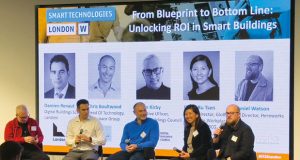Q: How did you progress through the profession to your recent role?
I have always had a fascination with buildings, their architecture and how they work. I moved into FM and operations on leaving Manchester University with a town & country planning degree, initially with the Inland Revenue. I progressed through various management positions following a move to Electronic Data Systems. (global IT services provider). My focus on IT services and integrated FM gave further experience in the management of large corporate offices and critical environments, specifically data centres. With the outsourcing of FM services to Stiell Facilities (subsequently acquired by Alfred McAlpine), I progressed through a series of multi-site operational roles, culminating in the position of National Operations Manager for a key account. A career highlight at that time was winning an Alfred McAlpine award for Customer Service Excellence in 2006.
In 2008 I was asked to join Europa Facility Services as Account Director for their retail business, with responsibility for the overall performance, management and development of key accounts. A priority of the role was to lead the re-tender programme for the Capital Shopping Centres (CSC) contract in 2010, after which Europa became sole soft service provider for the CSC UK portfolio.
Following the successful contract renewal and expansion I focused exclusively on the CSC account. The strength of the Europa and CSC relationship led to the creation of a joint venture (JV) between both organisations (known as intu Retail Services). CSC rebranded as intu Properties in 2013, the JV formed simultaneously, I took the role of Operations Director, representing Europa interests on the Board, and responsible for the delivery of operations to all (15) intu shopping centres in the UK, through a team of 2,000 colleagues.
Q: Do you have any qualifications or training in FM and related areas such as health and safety? And how have you benefited from them?
Through the years I have trained in a range of subjects from project management to coaching and mentoring. I was fortunate to receive a wealth of skills training while at the Inland Revenue, where investment in the development of people was an ethos of the team (and which encouraged the same spirit in me). At Stiell and Alfred McAlpine this continued with health & safety (e.g. IOSH), commercial, people management and business development training, all of which prepared me for the opportunities with the vibrant, growing business at Europa.
Alfred McAlpine Business Services had a fabulous internal learning and development team, and their leadership development programme was outstanding, enabling me to study change management techniques and how to prepare for and harness change. Learning quickly about the retail business at Europa in late 2008 prepared me for the transformational requirements essential during the global financial turmoil of that time, and that experience drew on my skills to lead and motivate the operational teams to deliver increased productivity with improving customer experience.
In recent years my focus has been on nurturing and developing talent, preparing future, aspiring business leaders, and upskilling operations and facilities managers with technical skills. Most recently, with the support of the exceptional people at Dale Carnegie Training, I have focused on the development of current and future leaders to enable their resilience and agility, and have worked closely with Investors in People to check and balance progress against targets.
Q: What is your greatest contribution to the FM sector, or your current role?
Being at the heart of the creation of a joint venture with a new brand, employing an operational team of more than 2,000 people (across the UK), with a combined budget in excess of £80m, the last six years have provided an outstanding opportunity, enabling me to lead and develop talented people wholly focused on transforming retail customer experience.
Our work has been recognised through a series of awards, from the Premises & Facilities Management Retail Partners in FM Award 2014 to the IWFM Impact on Employee Experience Award in 2018. Of greatest satisfaction for me personally, and perhaps my most significant contribution to the business, was leading the Investors in People accreditation for intu Retail Services, which was secured in 2015 and then built up to the Gold standard for all 15 shopping centres by 2017. This endeavour enabled me to fulfil a most enjoyable aspect of my role, connecting personally with the 2,000 colleagues in the shopping centres, and helping them focus on their contribution to the ambition of the organisation.
Q: What do you enjoy most about working in FM?
I’m a planner, I have an eye for detail, I enjoy developing ideas and strategies to support others, but for me, the thing I enjoy most about my work in FM is the people. I believe FM success is all about the customers, the clients, the team and the leaders: interlocking all interests most effectively to enable a business to succeed and prosper.
An early mentor in my leadership career gave me some straightforward advice: take care of your people, let them take care of your customer, and the business will take care of itself. I always have this in the back of my mind, and it resonates back to my childhood, living over the family shop, where my Dad had the most incredible way with his staff and customers, who loved him and how he was always there for them. He understood people, he knew what made them happy.
I get great pleasure from helping and supporting individuals to be the best they can, to focus on the positives, their successes, to see clearly how and why they make their contribution. If my team focus on what makes them feel joyful, how they can help their customer, then their community feel that happiness also. Consequently, the team feel personal reward for contributing to the lives of others. Everyone benefits, and ultimately business prospers.
Q: Do you have future projects or career goals in mind?
My career goal is to continue to lead successful teams, to help others to grow, sharing my experience, building long-term value for business. The need for exceptional customer experience transcends sectors, and the beauty of FM is that it connects and influences across all. That’s where I want to be.
My personal goals relate to my family and our community. My career sustains both. Volunteering to support charities important to my family and our community provides for my own wellbeing: whether I’m helping out at a local charity garden; litter picking in our neighbourhood; or as a trustee to help young families and children get the right support at the right time.
Q: What personal qualities do you think are most needed for a successful career in FM?
To build a relationship with a customer or a colleague, we’re not looking at something in isolation. Just as we would develop lasting relationships with friends, we build the same with customers and colleagues, based on integrity and trust. These are the essential qualities we need in life, and if we can add adaptability, resilience and creativity, we are more likely to be successful in our chosen career.
Q: What do you think would make the biggest difference to the FM sector?
Sometimes it feels as though we pigeon-hole aspects of FM: client-side; service provider; in-house; outsourced; hard or soft services. Categorisation can be helpful, however, it can also encourage barriers or limits. I believe there is more to be gained from taking a simple approach to understand common goals and unite everyone behind them. Individual purpose, output, language, communication all become more straight-forward if we have a few clear goals for everyone that draw people together. If managers are better equipped to have frequent, meaningful reviews of performance, and importantly to be open about their own performance, progress can be more easily measured and managed. It doesn’t matter who we work for or what our role is, if we clearly understand “the why” we are far more likely to succeed as individuals, teams and businesses.
Q: Are you a member of any FM association or body and if so, what benefits do you think they provide?
I joined IWFM around 20 years ago and have relied upon the institute on many occasions for intelligent information, insight and structure. I have encouraged others to join also to help their own professional development. Other institutes have contributed to my career or business, including the Institute of Customer Services and the Institute for Collaborative Working. I particularly like associations that confront conventional thinking and encourage me to challenge my own sense through articles and data analysis.
Q: What advice would you give to someone coming into the profession now?
Home in on your customers from the outset, introduce yourself and start to get to know them and their requirements. Seek the thoughts and observations of people within and outside the profession. Listen, listen and listen again. Start to build your network and seek advice on how to do this (there are so many approachable people in FM). Allow your ideas to grow and be courageous in sharing these with your colleagues and customers. As you get to know people in the profession, seek an independent mentor to support and coach you.
Q: What are the greatest challenges of working in FM?
A significant challenge is influence and impact on decision making. Effective FM can have a dynamic impact on efficiency, productivity and risk management. If the FM message is heard and valued at Board level, there is opportunity for business transformation. However, if that influence doesn’t make it through to impact on decision making, then the long-term success of the business is compromised. For example, cancelling (or at least continually postponing) capital investment will inevitably compound risk and consequences in future years. It’s not rocket science, however, someone (the FM) needs to champion the message. These impacts can be seen in many sectors from retail to healthcare, whether FM services are delivered through a service provider or in-house.
Q: What do you predict could be the main changes to the FM sector over the next few years?
Aside from top line political, environmental and macro-economic impacts on the built environment, workplace strategy will become increasingly impacted by the deployment of technology which enables tasks to be carried out in different ways, across diverse venues, and increasingly with little or no human input.
The aspirations of employees will develop. Flexible working, short-term contracts, gig worker expectations, will result in need for organisational design agility. Technology, for example artificial intelligence, will enable the development of tools and processes to support these elements, while leaders, colleagues and clients should aim to develop their social intelligence (and personal resilience), to enable stronger collaboration leading to more effectively managed change. Interestingly, people trained in “soft” skills (stronger communicators) are significantly more likely to be advocates for change.
The people working in FM are ideally placed to embrace technology and automation into the built environment. With insight, emotional intelligence, strategic thinking skills and creativity, FMs will be able to add significant value and harness the potential opportunities.




